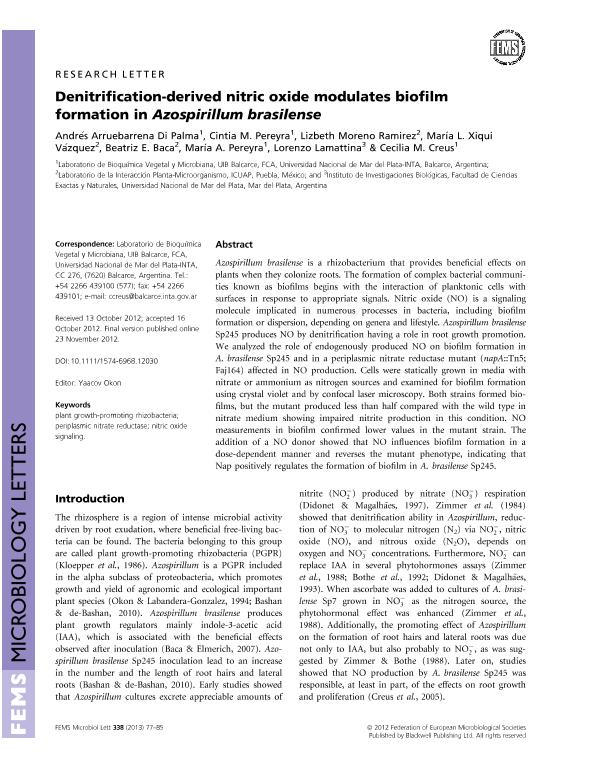Artículo
Denitrification-derived nitric oxide modulates biofilm formation in Azospirillum brasilense
Arruebarrena Di Palma, Andrés ; Pereyra, Cintia Mariana
; Pereyra, Cintia Mariana ; Moreno Ramírez, Lizbeth; Xiqui Vazquez, Maria L.; Baca, Beatriz E.; Pereyra, María Alejandra; Lamattina, Lamattina; Creus, Cecilia Mónica
; Moreno Ramírez, Lizbeth; Xiqui Vazquez, Maria L.; Baca, Beatriz E.; Pereyra, María Alejandra; Lamattina, Lamattina; Creus, Cecilia Mónica
 ; Pereyra, Cintia Mariana
; Pereyra, Cintia Mariana ; Moreno Ramírez, Lizbeth; Xiqui Vazquez, Maria L.; Baca, Beatriz E.; Pereyra, María Alejandra; Lamattina, Lamattina; Creus, Cecilia Mónica
; Moreno Ramírez, Lizbeth; Xiqui Vazquez, Maria L.; Baca, Beatriz E.; Pereyra, María Alejandra; Lamattina, Lamattina; Creus, Cecilia Mónica
Fecha de publicación:
01/2013
Editorial:
Wiley Blackwell Publishing, Inc
Revista:
FEMS Microbiology Letters
ISSN:
0378-1097
Idioma:
Inglés
Tipo de recurso:
Artículo publicado
Clasificación temática:
Resumen
Azospirillum brasilense is a rhizobacterium that provides beneficial effects on plants when they colonize roots. The formation of complex bacterial communities known as biofilms begins with the interaction of planktonic cells with surfaces in response to appropriate signals. Nitric oxide (NO) is a signaling molecule implicated in numerous processes in bacteria, including biofilm formation or dispersion, depending on genera and lifestyle. Azospirillum brasilense Sp245 produces NO by denitrification having a role in root growth promotion. We analyzed the role of endogenously produced NO on biofilm formation in A. brasilense Sp245 and in a periplasmic nitrate reductase mutant (napA::Tn5; Faj164) affected in NO production. Cells were statically grown in media with nitrate or ammonium as nitrogen sources and examined for biofilm formation using crystal violet and by confocal laser microscopy. Both strains formed bio- films, but the mutant produced less than half compared with the wild type in nitrate medium showing impaired nitrite production in this condition. NO measurements in biofilm confirmed lower values in the mutant strain. The addition of a NO donor showed that NO influences biofilm formation in a dose-dependent manner and reverses the mutant phenotype, indicating that Nap positively regulates the formation of biofilm in A. brasilense Sp245.
Archivos asociados
Licencia
Identificadores
Colecciones
Articulos(IIB)
Articulos de INSTITUTO DE INVESTIGACIONES BIOLOGICAS
Articulos de INSTITUTO DE INVESTIGACIONES BIOLOGICAS
Citación
Arruebarrena Di Palma, Andrés; Pereyra, Cintia Mariana; Moreno Ramírez, Lizbeth; Xiqui Vazquez, Maria L.; Baca, Beatriz E.; et al.; Denitrification-derived nitric oxide modulates biofilm formation in Azospirillum brasilense; Wiley Blackwell Publishing, Inc; FEMS Microbiology Letters; 338; 1; 1-2013; 77-85
Compartir
Altmétricas



